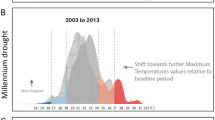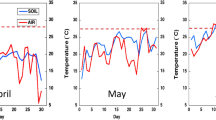Abstract
The development of sprouting tolerant spring and winter wheat varieties that retain dormancy in cool, wet conditions is a long-term objective in Hokkaido, Japan. A highly tolerant spring dwarf line, “OS21-5”, derived from “Tordo” × “Zenkoji”, was used to develop transgressive spring, “OS38” and “OS74”; and winter, “OW77”, “OW104” and “OW93” wheats. More recently, winter lines with improved agronomic performance, though still deficient in quality and scab resistance, have been identified. In general, germination percentage of mature grain at 10 °C was closely related to the mean temperature experienced during the 5 days prior to maturity (dough–yellow ripening stage) and to the capacity to maintain a high amylograph paste viscosity. Dormancy at 10 °C appeared to be determined by a combination of genotype and variation in sensitivity to temperature during the later stages of ripening. Genotypes such as “OS38” and ‘OWl04’ were both highly tolerant to germination at 10 °C and insensitive to temperature during ripening. By comparison, most of the other cultivars showed a similar, intermediate sensitivity to ripening temperature, and dormancy decreased as ripening temperature increased. Dormancy of‘RL4137’ at maturity, and to a lesser extent ‘Gifukomugi’ and ‘KKI354’, was very sensitive to ripening temperature and useful levels of dormancy only developed under cool ripening temperatures, mean temperature < 18–20 °C.
Similar content being viewed by others
References
Bhatt, G.M., N.F. Derera & G.I. McMaster, 1977. Utilization of Tom Thumb source of pre- harvest sprouting tolerance to a wheat breeding programme. Euphytica 26: 563–572.
Derera, N.F. & G.I. McMaster, 1977. New concepts in breeding for pre-harvest sprouting research. In: 3rd International Congress of SABRAO. Canberra, Australia, Vol. 3, pp. 33–38.
Flintham, J.E. & M.D. Gale, 1980. The use of Gai/Rht3 as a genetic base for low α-amylase wheats. Cereal Res Commun 8: 283–290.
Gale, M.D., J.E. Flintham & E.D. Arthur, 1983. Alpha-amylase production in the late stages of grain development an early sprouting damage risk period? In: J.E. Kruger & P.E. LaBerge (Eds.), Third International Symposium on Pre-Harvest Sprouting in Cereals, pp. 29–35. Westview Press, Boulder, CO, USA.
Gale, M. & G.A. Marshall, 1975. The nature and genetic control of gibberellin insensitivity in dwarf wheat grain. Heredity 35: 55–65.
Hoshino, T., N. Tomooka, K. Fukunaga & H. Seko, 1989. Testing method of pre-harvest sprouting and genealogical pedigree of pre-harvest sprouting resistant cultivars in wheat. Jpn J Breed 39: 365–372.
Kuwabara, T. & K. Maeda, 1979. Breeding for dormancy under different thermo conditions during maturation. Japan J. Breed. 29(Suppl 1): 26–27.
Mares, D.J., 1984. Temperature dependence of germinability of wheat (Triticum aestivum L.) grain in relation to pre-harvest sprouting. Aust J Agric Res 35: 115–128.
Mares, D.J., 1995. Dormancy in white wheat: Mechanism and location of genes. In: Kaz Noda & D.J. Mares (Eds.), Pre-Harvest Sprouting in Cereals 1995, pp. 179–184. Center for Academic Societies, Japan.
Mares, D.J. & M.D. Gale, 1990. Control of alpha-amylase synthesis in wheat grains. In: K. Ringlund, E. Mosleth & D.J. Mares (Eds.), Fifth International Symposium on Pre-Harvest Sprouting in Cereals, pp. 183–194. Westview Press, Boulder, USA.
Mares, D.J. & K. Mrva, 2001. Mapping quantitative trait loci associated with variation in grain dormancy in Australian wheat. Aust J Agric Res 52: 1257–1266.
Nakatsu, S., 2000. High α-amylase activity in wheat (Triticum aestivum L.) grain from Hokkaido. Report of Hokkaido Pref. Agr. Exp. Stn. 93: 1–60.
Nakatsu, S., H. Miyamoto & Y. Amano, 1995. Variation for α-amylase activity and dormancy in Hokkaido wheat varieties. In: Kaz.Noda & D.J. Mares (Eds.), Pre-Harvest Sprouting in Cereals 1995, Center for Academic Societies, Japan, pp. 411–418.
Nicholls, 1986. Induction of sensitivity to gibberellic acid in wheat and barley caryopses: Effects of dehydration, temperature and the role of the embryo during caryopsis maturation. Aust J Plant Physiol 13: 785–794.
Noda, K., Y. Amano & T. Suzuki, 1999. Pre-harvest sprouting in wheat and weather condition. Breed. Res. 1: 15–19.
Oda, S. & H. Seko, 1992. Evaluation of pre-harvest sprouting resistance in wheat using germination tests conducted at two temperatures. In: M.K. Walker Simmons & J.L. Ried (Eds.), Sixth International Symposium on Pre-Harvest Sprouting in Cereals, pp. 69–75. AACC, St. Paul, USA.
Osanai, S.I. & Y. Amano, 1992. Selection lines to low temperature germinability in wheat. In: M.K. Walker Simmons & J.L. Ried (Eds.), 6th International Symposium on Pre-Harvest Sprouting in Cereals, pp. 76–82. AACC, St. Paul, USA.
Osanai, S.I. & Y. Amano, 1998. Resonse of winter wheats showing reduced germinability at low temperature to rain during grain development and ripening. In: D. Weipert (Ed.), Eighth International Symposium on Pre-Harvest Sprouting in Cereals, pp. 57–66. Association of Cereal Research, Detmold, Germany.
Reddy, L.V., R.J. Metzger & T.M. Ching, 1985. Effect of temperature on seed dormancy of wheat. Crop Sci 25: 455–458.
Author information
Authors and Affiliations
Corresponding author
Rights and permissions
About this article
Cite this article
Osanai, SI., Amano, Y. & Mares, D. Development of highly sprouting tolerant wheat germplasm with reduced germination at low temperature. Euphytica 143, 301–307 (2005). https://doi.org/10.1007/s10681-005-7887-8
Issue Date:
DOI: https://doi.org/10.1007/s10681-005-7887-8




